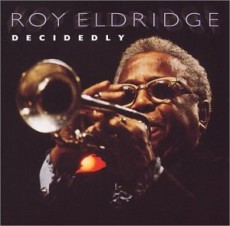
Daily Dose Of Jazz…
Roy Eldridge was born David Roy Eldridge on January 30, 1911 on the North Side of Pittsburgh, Pennsylvania. His mother was a gifted pianist with a talent for reproducing music by ear, a talent inherited from her. He began playing piano at age five, took up drums at six, played bugle in church and by eleven began seriously honing the instrument, especially the upper register. Though lacking a proficiency at sight-reading, he could replicate melodies by ear effectively.
Eldridge’s early years had him leading and playing in a number of Midwest bands and absorbed the influence of saxophonists Benny Carter and Coleman Hawkins in developing an equivalent trumpet style. Leaving home after expulsion from high school in ninth grade he joined a traveling show at sixteen until it folded in Youngstown, Ohio. He then joined a carnival, returned home and found work in another traveling show. By 20, he led an orchestra, auditioned for Horace Henderson, played in a number of territory bands, formed his own short-lived band once again, moved to Milwaukee and took part in a cutting contest with Cladys “Jabbo” Smith.
Eldridge moved to New York in 1930, playing in Harlem dance bands, and got the nickname “Little Jazz” from Ellington saxophonist Otto Hardwick. He laid down his first recorded solos with Teddy Hill in 1935, led his own band at the reputed Famous Door nightclub and recorded a number of small group sides with singer Billie Holiday. He would join Fletcher Henderson’s band, becoming his featured soloist because of his ability to swing a band. He would move to Chicago to form a band with his older brother, playing saxophone and arranging. In the 40s he joined the Gene Krupa Orchestra, staying until the band broke up after Krupa was jailed for marijuana possession.
Over the course of his career, Little Jazz would play with Anita O’Day, Jazz At The Philharmonic, Coleman Hawkins, Ella Fitzgerald, Earl Hines, Abbey Lincoln, Charles Mingus, Eric Dolphy, Kenny Dorham, Max Roach, Count Basie, Artie Shaw and the list goes on and on. His sophisticated use of harmony, including the use of triton substitutions, his virtuosic solos exhibiting a departure from the smooth and lyrical style of earlier jazz trumpet innovator Louis Armstrong, and his strong impact on Dizzy Gillespie mark him as one of the most influential musicians of the swing era and a precursor of bebop.
In 1971 trumpeter Roy Eldridge was inducted into the Down Beat Jazz Hall of Fame. After suffering a heart attack in 1980, he gave up playing. He died at the age of 78 on February 26, 1989 at the Franklin General Hospital in Valley Stream, New York, three weeks after the death of his wife, Viola.
More Posts: trumpet


